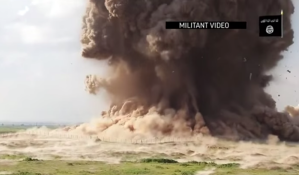
The terror group known as ISIS continued its campaign of wiping out anything it considers being not compatible with its brand of Islam. Now it has taken out that fury on the ancient Iraqi city of Nimrud over the weekend.
According to Charlie D'Agata of CBS News, ISIS released a new video that claimed it destroyed an ancient city in Iraq that has stood for 3,000 years. If the video's contents are independently confirmed, then one of Iraq's greatest historical treasures, located south of Mosul, has been wiped out.
"God has honored us in to remove all of these idols and statutes worshipped instead of Allah," a jihadist said in the video.
D'Agata reported that bulldozers and barrels full of explosives were used to destroy the city. In addition, the video showed men using sledgehammers and jackhammers to take down walls, while others used power tools to cut through stones.
According to a report from the Associated Press, U.N. Secretary-General Ban Ki-moon has called the destruction of Nimrud "a war crime." The militants have also destroyed the ancient Iraqi city of Hatra, a UNESCO World Heritage site.
"Whenever we seize a piece of land, we will remove signs of idolatry and spread monotheism," another ISIS militant said.
An Iraqi Antiquities Ministry official, who spoke to the Associated Press on Sunday on condition of anonymity, said that all the items destroyed by ISIS in Nimrud were authentic. Other authorities noted that ISIS may have sold other antiquities on the black market to fund their atrocities.
"Some of the figures in the video released Saturday at Nimrud appeared to have rebar, ribbed bars of steels designed to reinforce concrete that are a technique of modern building," the Associated Press wrote. "In March, both Iraqi and United Nations officials warned the site had been looted and damaged."
The Associated Press elaborated on the history and culture of the Assyrians, who first rose to power around 2,500 B.C. The city which ISIS destroyed, Nimrud, served as the second capital for the Assyrian Empire.
"They left dozens of palaces and temples decorated with huge reliefs mainly depicting their kings' military campaigns and conquests, hunting lions and making sacrifices to the gods," the Associated Press wrote. "Their main hallmark was the colossal winged man-headed lions or bulls, protective deities put at the entrances of palaces and temples weighing about 10-30 tons each."
According to the Associated Press, British traveler and archaeologist Austen Henry Layard first started excavations at Nimrud from 1845 to 1851. One of the biggest discoveries in that ancient city included four tombs of royal women, which contained a collection of 613 pieces of gold jewelry and precious stones.







